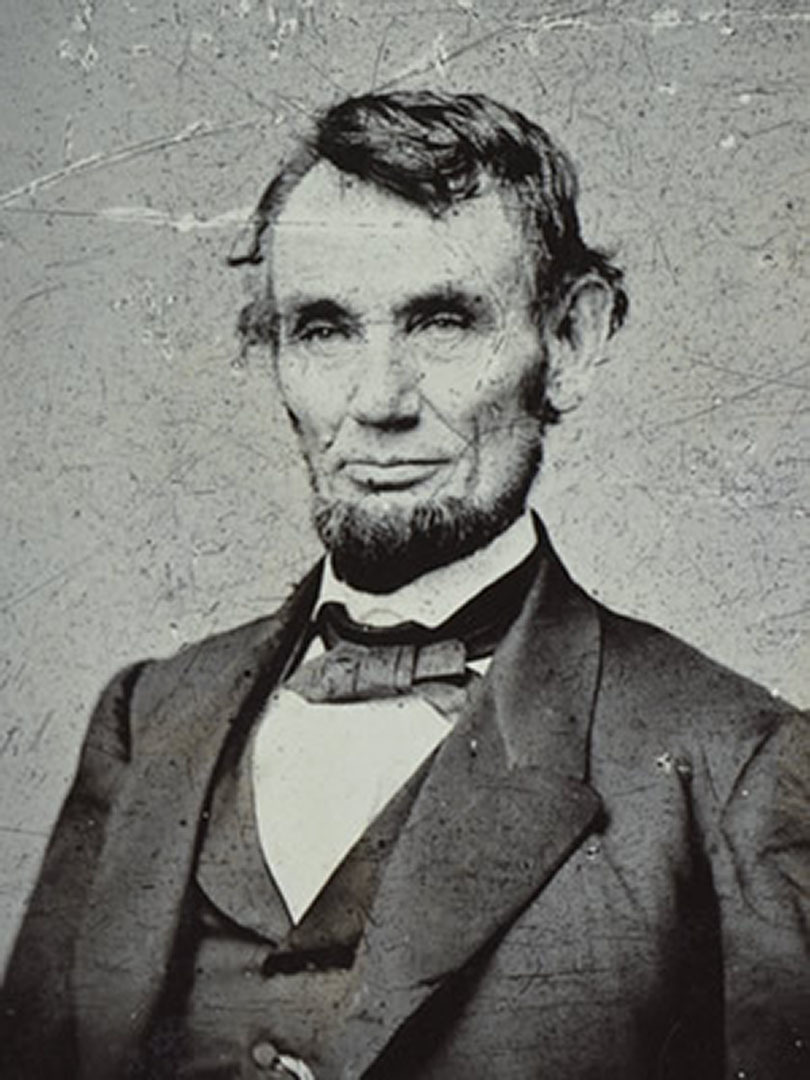Abraham Lincoln

1809–65
Kentucky
President
Considered one of the nation's greatest presidents, Abraham Lincoln remains a tragic historical figure, gunned down by an assassin just days after winning the nation's bloodiest war. A Republican lawyer from the backwoods who produced the most enduringly elegant phrases of modern rhetoric, Lincoln's surprising election in 1860 helped spark the war itself. His Gettysburg Address (1863) and Second Inaugural Address (1865) are two of his most revered speeches.
Lincoln's story is remarkable in many ways, not least his rise from humble beginnings to the highest office in the land. Born in a one-room log cabin in Hardin (now LaRue) County, Kentucky, Lincoln spent his youth in Indiana and Illinois, receiving little formal education. As a young man, Lincoln worked in New Salem, Illinois as a laborer, shopkeeper, and postmaster, acquiring social skills and honing his talent for story-telling. Well-liked, he was elected to the lower house of the Illinois State Legislature in 1834. He moved to Springfield in 1837, was admitted to the state bar, and with a series of partners, built a successful law practice.
After a single term in the House of Representatives (1847–49) and a return to practicing law, Lincoln was morally outraged at the 1854 passage of the Kansas-Nebraska Act, which gave states the right to determine whether to allow slavery. He joined the newly formed Republican Party and reentered politics, defeating sitting U.S. Senator Stephen Douglas. The campaign was characterized by a series of outstanding and well-attended debates. In his acceptance speech, Lincoln criticized President Buchanan, denounced slavery, and declared "a house divided cannot stand."
In 1860, he defeated a field of four candidates to become the 16th president of the United States; not a single ballot was cast for him in 10 of the 15 southern slave states. Before his inauguration, seven states had seceded from the Union. Six of these together formed the Confederate States of America, electing Jefferson Davis as its president.
On April 12, 1861, barely a month after Lincoln took office, Confederate forces fired on Union troops at Fort Sumter, South Carolina, and the Civil War began. Lincoln acted swiftly, wielding more authority than any president before him: he appropriated $2 million from the Treasury for war materials without congressional approval; he called 75,000 volunteers into military service without a declaration of war; and he suspended habeas corpus, imprisoning suspected Confederate sympathizers and spies without a warrant. Throughout the war, he was challenged by his cabinet, his generals, his party, and, at times, the majority of the population. But by 1863, he felt confident enough to issue the Emancipation Proclamation, which declared that all slaves "henceforward shall be free."
Lincoln was reelected with 55 percent of the popular vote and 212 of 243 electoral votes in late 1864. On April 9, 1865, the war ended when General Robert E. Lee surrendered his forces at Appomattox. Five days later, Lincoln was assassinated by Confederate sympathizer John Wilkes Booth, shot in the back of the head while attending a play at Ford's Theatre in Washington, D.C. His body lay in state in the Capitol Rotunda before being transported by train to his gravesite in Springfield, Illinois. The funeral train stopped in many cities along the way, where memorials were attended by hundreds of thousands of mourners.
Lincoln's death at a time when the nation needed him most, to finish the task he had begun, is considered one of the saddest events in American history. In presidential ranking polls, he is consistently placed in one of the three top spots, frequently at number one.
Back To Biographies